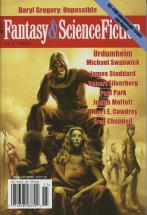
“The Diamond Shadow” by Fred Chappell
“The Star to Every Wandering Barque” by James Stoddard
“The Recreation Room” by Albert E. Cowdrey
“The Bird Shaman’s Girl” by Judith Moffett
“Two Weeks After” by M. Ramsey Chapman
“Fragrant Goddess” by Paul Park
“Unpossible” by Daryl Gregory
Chappell is an engaging writer, especially of economical, intriguing dialogue. However, “The Diamond Shadow’s” wit and worldcraft fall to a crashing halt under the expository blathering of Astolfo. Explaining much about shadowcraft to Falco rather than letting Falco (and the reader) experience this rather neat idea for our own, the character of Astolfo effectively deadens “The Diamond Shadow.” Chappell seems more enamored of his own invention here than of plot and momentum, but I do hope that future stories bring this world alive because it contains a fascinating idea just struggling to get out.
In “The Star to Every Wandering Barque” by James Stoddard, the weirdness attacks early. People the world over start confessing their faults, professing love, eschewing violence. Soon, the strange waves of goodness progress across the entire planet, with whole populations becoming blissfully happy because almost every single aspect of their lives is healthy and fulfilling. Meanwhile, if you have a cynical, ironic streak the way that I do, you’re wondering what sort of opiates, brainwashing and/or alien invasion Stoddard’s characters are experiencing. However, to the author’s credit, he constructs his utopian world with such detail, at macro and micro levels, that it seems utterly convincing. He manages to write a paean to NASA that’s uplifting and sweet without being preachy. And maybe just knowing that such visions of the world exist will restore your faith in humanity. I would have saved this one for an inspiring concluding story to the issue.
Albert E. Cowdrey’s “The Recreation Room” features a ripped-from-the-headlines setting of post-Katrina New Orleans. Jim Guest returns to the aftermath, reflecting on the changes wrought by the storm. The reader shares in his mournful astonishment and sense of loss for Jim’s carefree way of life so quickly torn apart. A twist worthy of the Twilight Zone marks the end of this modest story. I personally would have cranked up the pathos to increase the parallel between Jim’s displacement and haunting and the general retrospective disbelief of the nation at large, but, though understated, “The Recreation Room” closes with a successful punch.
“The Bird Shaman’s Girl” by Judith Moffett mixes disparate ingredients—Pecos river rock art, clairvoyance, shamanism, and a polygamous religious sect that smells suspiciously like a Mormon splinter group—and tries to toss them into a delicious salad. It doesn’t work. At its heart, the story of social worker Pam defending her Ephremite charge, Lexi, from the misogynist clutches of her oppressive family is fraught with compelling conflict. But Moffett’s writing meanders off into pseudo-historical TV shows and petroglyphs in ways that stall all forward momentum. Like Chappell earlier in the issue, Moffett undoes her story by focusing more on her own inventions than on making the story believable or the characters sympathetic.
“Two Weeks After” by M. Ramsey Chapman follows the adventures of two car-crash victims’ ghosts who return to their spouses fourteen days after dying. With tongue in cheek, Chapman handles the practical aspects of a haunting (the weird solidity of the ghosts, the funny freak-outs of their spouses) deftly, bringing an edge of realism to the paranormal genre. The clever separation at the end (ghost vs. soul?) makes you wonder whether you can parse the good and bad out of a human being.
I can follow the plot of Paul Park’s “Fragrant Goddess.” At least I think I can. It concerns an academic, Jeremy, who, on the track of the secrets of an old alchemist, runs into Sabine, a former lover. Jeremy becomes slightly unhinged as he tries to figure out what Sabine feels for him and also whether Fragrant Goddess, the fabled remedy of the title, actually exists. The story spends most of its word count on Jeremy and Sabine’s complicated past, which would be more interesting if the charming, free-spirited Sabine had more than a cipher to balance her out. Jeremy’s character, however, remains unelucidated. I know why he pursues Sabine, but why is he so interested in this old alchemical secret? There might be some sort of time-warping, long-lost-love-finding power that this elixir has, but such a power was only hinted at and then whammo. The story ends abruptly after a protracted build-up, leaving me puzzled and uninterested. And I read it twice!
We all know that you can’t take it with you, but it’s an equally resounding truism that you can’t return to the worlds of your youth. That doesn’t keep our nameless, lonely protagonist in Daryl Gregory’s “Unpossible” from trying. While he makes his pitiful, all-too-familiar attempts to resuscitate the past, the protagonist meets a man with a similar quest, and they end up turning their misconceptions around. A bittersweet tale that evokes the nostalgia of middle age and the endless promise of childhood at the same time.
Michael Swanwick’s “Urdumheim” is the last story in the issue. Seemingly inspired by Mesopotamian creation myths, it tells about an invasion of talking animals, magical beings who steal the words of the early humans, leaving the humans literally wordless and devolved. A war between the talking animals and more benevolent gods breaks out, with the semi-incoherent humans in the midst. I didn’t care much for this story, which seemed dissonant in tone (e.g., the juxtaposition of Sumerian weaving goddess Inanna with the animal king who speaks in George Bushisms). Because of the overwrought prose and the dramatic suffering of all characters, the story appeared hammy, even a bit bombastic, although I think it was supposed to be serious. The roughness of the creation distracted me from any strengths the story might have had.